- Home
- Jane Peart
Daring Bride Page 5
Daring Bride Read online
Page 5
She was sorry it had all erupted like that. On the other hand, she didn’t care. It was inconceivable to her that Kip and Cara did not feel the same way she did. Her determination stiffened.
She had to do something. If more people knew what war was really like, if they had had her experiences, seen maimed bodies, destroyed nerves, ravaged lungs, battered minds…Maybe their fallowing would turn her anguish into something positive. She had to pray about it, ask God what she could do. She already had a platform—whenever she read Richard’s poetry or was asked to speak somewhere. But something more was needed. What, she wasn’t yet sure.
Slowly the idea for a book formed in her head. It would be written like a diary kept by an army field nurse. She had kept a journal of sorts, and her memories were vivid. She could dig into those long-buried scenes, incidents, and experiences, retell them in such a manner that readers would be brought into them. It would be painful to relive her past, but it would be worth it if she could make people understand what war really meant.
Garnet had to wait for the opportunity to talk to Bryanne. Her granddaughter attended art classes at the university, commuting from Mayfield to Williamsburg three days a week. The time for Garnet to present her plan did not come until the weekend before she was scheduled to leave. She asked Bryanne to accompany her on a stroll through the gardens.
“Well, dearie, at last—a chance to have a nice, private chat with my granddaughter,” Garnet began, slipping her hand through Bryanne’s arm. “The days have gone by so quickly. It seems I’ve hardly come, and now I’ll be leaving. I wanted so much to discuss your future with you. I wanted to tell you my idea.”
Bryanne felt a small inward warning that whatever her grandmother was going to suggest might require some powerful resistance, something she had never been good at.
“What is that, Grandmother?”
“Let’s sit in the gazebo, where we can be comfy,” Garnet suggested, pointing with her cane to the white, ornately cupolaed little summer house at the end of the garden. “You know, it was my mother who had that built. Or rather, my father who had it built for her. The story is quite romantic, actually. It seems it was in just such a gazebo, in the garden of her Savannah home, that he proposed to her. He absolutely adored her and felt himself the luckiest of men to have wooed and won her. She was a Maitland and quite a belle, and he had to compete with countless suitors to bring her to Cameron Hall as his bride.”
They mounted the three steps into the latticed enclosure and sat down on the bench that circled the interior.
“Now, Bryanne, what I’m suggesting is this—that you come to Birchfields this summer. While you’re staying with me, I’d like to give you a trip to Italy as a gift, all expenses paid.” She paused, eyeing Bryanne for her reaction. “You can take as long as you like—a month, six weeks. That will give you a chance to visit all the great museums, the cathedrals, the galleries, where some of the greatest statuary of the centuries is on exhibit. It will be a source of instruction and inspiration. How does that sound?”
“Oh, Grandmother, that sounds very generous, very wonderful—”
“Do I hear a ‘but’ in there somewhere?” Garnet asked shrewdly, sensing Bryanne’s reluctance. The sweet young face had an expression of distress, and the clear eyes were clouded with uncertainty. Surely the child wasn’t going to turn down the invitation? Any young artist would jump at the chance.
“Well, you see, Grandmother—,” Bryanne began.
Instinctively Garnet pursed her lips. She suspected this had something to do with Bryanne’s father. Garnet always winced a little when she thought about the well-known artist whom her daughter had loved and married, a man Garnet had always had misgivings about. “The idea of going to Italy doesn’t appeal to you?”
“Oh no, Grandmother, it’s not that. It’s just that…” Bryanne hesitated. “Father is going to Scotland this summer to see Uncle Jonathan’s widow, Phoebe, and Fraser and Fiona. I thought I might go with him___”
Garnet pressed her lips firmly together before asking, “And has he asked you to go with him?”
“No, not exactly. But if I go to England to visit you, I thought maybe Father and I could travel together and then I might go up to Scotland with him.”
Poor child, still knocking at a door that’s never going to open, was Garnet’s immediate reaction. She had seen Bryanne’s hopes dashed before. But she also knew better than to discourage her. Bryanne would rush to her father’s defense, and it would only stiffen her resistance to accepting Garnet’s offer.
“Of course, you must do whatever you think best. The offer holds if you want to take me up on the trip to Italy.” Feeling suddenly stiff, Garnet rose with the help of the ivory-handled cane she used at times. “You know you will always be welcome at Birchfields, whatever or whenever. It is, after all, your home, too.” She tucked Bryanne’s hand through her arm and patted it affectionately. “Come, we’ll go inside now. Jill will be wondering where we’ve got to. Besides, it’s teatime. An Englishwoman, no matter where she lives, Virginia or South Africa, serves tea every afternoon. I’ve found it to be a delightful custom myself, and do so at Birchfields.”
Enough had been said at the moment, Garnet decided. She had sowed the seed that she hoped would take root in her granddaughter’s mind. Garnet wanted very much for that to happen. The big country estate had become lonelier as the years had gone by. It would be lovely to have a young person around again.
At length it was time for Garnet’s return journey to England.
The morning of her departure, she woke with a pervasive melancholy. It was nonsense, of course. Wasn’t she going back to her own home, to all the luxuries and comforts she indulged herself in and thoroughly enjoyed? As she finished her last-minute packing, she fought this mood.
However, the fact was that she would probably not make this trip again. Not at her age. And after all, it was only natural for her to feel some sorrow at leaving Cameron Hall, where she had spent her childhood, and Montclair, where she had spent her young womanhood. Almost all the important things in her early life had happened here in Virginia.
The quotation “Farewell: We never do anything consciously for the last time without sadness of heart” sprang into her mind. Where had she read that? Maybe in one of Grace Comfort’s columns?
She chided herself for feeling sad. Looking back was a sign of old age, a reality she had thus far been successful at keeping at bay.
Besides, she had reason to feel that her visit in Mayfield had been worthwhile. She was satisfied that Gareth was finding his own path and was reasonably happy. If only he could find a wife who would support his ideals, want to live his simple kind of life. Lynette, of course, had married well and was a perfect politician’s wife—gracious, charming, outgoing.
It was Bryanne who concerned Garnet. But one could only do so much. Young people today had minds of their own. Combating the child’s idealized image of her father was impossible. Jeff Montrose, in his daughter’s eyes, was the man she wanted him to be, not the man he really was. Someday Bryanne would find that out. Garnet only hoped it would not break her heart.
A tap came at the bedroom door, and she heard Jill’s voice. “The limousine driver is here, Aunt Garnet.”
“I’ll be right down,” Garnet replied, picking up her marten fur piece, adjusting her hat in the mirror. She took a sweeping look around the room to see if she’d forgotten anything, then went downstairs.
Good-byes were said, and Scott assisted her carefully into the sleek, black Chrysler.
“Come again next spring, Aunt Garnet,” he said.
“Thank you, dear,” she said, smiling, knowing that they both knew it was unlikely she would do so.
As the limousine made its leisurely way down the driveway and through the stone posts of the gate, Garnet turned and looked through the rear window, back to the stately house. She raised one gloved hand in a kind of royal wave. Then she settled back against the cushioned gray velour upholster
y, determined to enjoy the trip to Richmond, Washington, New York, and then home to Birchfields.
chapter
6
1934
JEFF MONTROSE’S PLANS to visit Mayfield the previous summer had changed abruptly. He had gone to California to visit his mother, Blythe, before going abroad. While traveling up the coast, he had discovered Carmel, the picturesque art colony south of San Francisco. Awed by its scenic beauty, he had decided to stay there for the winter to paint.
So it wasn’t until the following spring that he finally made it to Mayfield. Upon his arrival, he was a bit taken aback to find that Bryanne had booked passage on the same ship, the SS Mauratania, on which he was sailing from New York. She told him she had accepted her Grandmother Garnet’s invitation to spend a summer with her in England but first wanted to accompany him to Scotland, see Phoebe, and meet her cousins.
If Jeff had thought about it at all, he would have been amazed at what a challenge it had been for his daughter to take such an initiative. True to himself, Jeff simply declared that he was pleased at her coming and acted as if it had been his idea.
However, if Bryanne had expected this sea journey to bring a new relationship with her father, she was disappointed. As soon as the news was out that the well-known painter was on board, he was lionized. Still handsome at fifty, Jeff epitomized the popular image of an artist and played his role to the hilt. Wearing a slouch-brimmed hat and cape, he took his twice-daily strolls on deck, collecting companions along the way. Celebrity always attracted, and Jeff gloried in the attention. For Bryanne, watching this day-to-day drama unfold was a sobering learning experience. Jeff was invited to private parties, was asked to sit at the captain’s table, and was eagerly sought after wherever he went about the ship. When they were together, of course, Jeff always introduced Bryanne. However, most of the time he conducted himself as though he were traveling alone.
With only two days left before they were to arrive in England, Bryanne decided to confront her father. Joining him on his morning stroll, she took his arm and said, “Father, I’d really like to talk to you about something—something that’s important to me.”
He looked surprised but said, “Of course, my dear. Go right ahead.”
Not wanting to be interrupted by passing acquaintances, she led him over to the rail. “I’d so hoped, Father, that this trip would bring us closer, that we’d get to know each other better.” She began to feel both nervous and hesitant about how to proceed.
“And we are, aren’t we? You’re enjoying all this, aren’t you? There seems to be a fine group of young people on board, lots going on—”
Frustrated, Bryanne shook her head. “That’s not what I mean. I mean you and I, Father.”
Jeff looked puzzled, then amused. “Well, here I am, darling girl. What you see is what you get. What more do you want?”
“It’s just that I grew up hardly knowing you, and I thought this would be our chance.”
Jeff’s expression changed, a shadow passing over his countenance. “I’m sorry, my dear. Fate dealt us a cruel blow. Losing your mother the way we did changed everything. For me and for you children. We can’t go back and undo that.” He paused. “It nearly broke me. But I knew I had to go on, make something of the rest of my life. That’s what I tried to do. And I think I succeeded in doing it.” He sighed. “I know it was hard on you, but you had your grandmothers, both of them, and your brother and sister. It wasn’t as though you were left alone.”
Just then two fellow passengers strolled by, smiled, and stopped to say good morning.
A casual conversation about the day’s posted activities ensued, and Bryanne knew that her time with her father had ended. Unsatisfactorily for her, but maybe that’s as far as they would have gone even if they hadn’t been interrupted.
What she thought she understood was that her father had had to save his life by plunging himself completely into his art. It had been his response to an intolerable loss. To justify his actions, he rationalized that his children had been well cared for, had not suffered irreparable damage.
Shipboard life was too lively, too full of people, Bryanne told herself Maybe when they got to Scotland, things would be different. They’d take long walks together, and then there would be quiet times when it might be possible to reach her father.
When they docked in England, they wired ahead news of their arrival, then took the highlander train to Scotland. Phoebe Montrose was there to meet them at the small station. A tall, handsome woman, she was plainly dressed but had the presence of a duchess. Bryanne admired the bone structure of her face, the clarity and color of her eyes. Phoebe’s warm smile made her almost beautiful as she greeted them. “So this is little Bryanne. I’m sure you don’t remember me. It’s been so long since I was in Virginia. But I knew your mother, and she was one of the loveliest women I’ve ever met.”
She directed them to place their luggage and Jeff’s painting equipment on a cart to be delivered later.
“It’s only a short walk,” she told them, “and I expect you’ll welcome a chance to stretch your legs after the long train trip.”
As she had said, it was only a small distance through the village to the McPherson Arms, her family’s hotel. After her husband’s death, Phoebe had moved to Kilgaren to take over its management from her uncle, who wanted to retire.
Kilgaren was a small, quaint town of gray stone houses with slate roofs, built on the hilly, winding streets. They crossed an arched stone bridge and soon were at the hotel. Phoebe’s uncle, Gordon McPherson, rangy and big-boned, still hale and hearty at eighty, met them in the front hall, accompanied by two bright-eyed, redheaded children. These were Jeff’s nephew and niece, Fraser and Fiona Montrose. They smiled shyly as their mother introduced them.
“Come along and have tea!” urged Uncle Gordie, motioning them forward toward the large lobby, where a fire crackled in a large stone fireplace. “A real good Scottish tea,” he said with a booming laugh, pronouncing it “gude.”
The tea proved not only good but enormous, much more a meal than the tea and sandwiches and cookies Bryanne was used to at home. They sat in front of the fireplace and ate while listening to Uncle Gordie’s tall tales about streams jumping with trout and salmon, about spectacular views from the cliffs. Bryanne liked him immediately. He was her idea of a rugged Scot, with his shaggy white hair, his bristling eyebrows, and his blue eyes, which sparkled with wisdom and good humor. Both he and Phoebe put her immediately at ease. Bryanne decided that in terms of its hospitality, Scotland had every bit as much to boast about as Virginia.
Bryanne still did not get the chance to become closer to her father, however, despite the fact that here there were no crowds, no one else vying for his time or attention. Once Jeff started to paint, he was lost in his work and seemed to forget that she existed.
With extraordinary sensitivity, Phoebe seemed to understand the situation. On Bryanne’s third day in Kilgaren, Phoebe invited her to have tea alone together in her apartment there at the hotel.
A coal fire glowed in the small fireplace, reflecting its winking lights on the polished brass fender. A low table had been drawn up in front. A starched white cloth covered it, and a teapot with a crocheted cozy, teacups, and a basket of freshly baked currant scones were set out.
“I’m sure it seems dull and rather boring for you here, doesn’t it?” Phoebe asked Bryanne as she filled a cup and handed it to her. “There’s not much to do if you don’t enjoy tromping the hills or fishing.” Her eyes twinkled mischievously. “Or painting.”
“But I do enjoy all those things. I’d just hoped that my father and I could do them together,” Bryanne replied, too honest to pretend otherwise.
Phoebe nodded. “I know. You see, I know your father. I’ve known him since he was a very young man. Jeff Montrose is the most fascinating man I’ve ever met. Creative, enthusiastic. Even then he was self-centered and not tactful at all, but he had so much charm, one hardly minded.” Phoebe paused.
“I knew your mother too. She and Jeff came here several times, did you know that? And Faith was just the wife he needed. She adored him, you see. And understood him. I worried about her when they were here. They had been married only a short time, and she was so lovely, and he left her on her own for hours at a time. I started to feel sorry for her. She would have none of it. She just smiled and told me, ‘He’ll paint as long as the light lasts. There’s no use worrying about him.’ You’ll have to learn that, too.”
“I don’t know, Aunt Phoebe,” Bryanne said thoughtfully. “Perhaps it’s too late. Maybe it would be best for me to go. Then he would be free and wouldn’t feel guilty, as he must now. That is"—she smiled ruefully—“if he remembers I’m here. My grandmother wants me to visit her. She is giving me a trip to Italy.”
“We’d love to have you stay, if that’s what you decide,” Phoebe said matter-of-factly. “Well, think about it some more, pray about it. Then do what you think is best.”
After tea Bryanne took a long walk. It was beautiful country. The river wound like a silver ribbon through the rocky hills. Trees lined the banks, and beyond were the rolling moors, covered with lavender heather and gorse. Above on the blue-gray hills, sheep grazed. The air was so crystal-clear, it almost hurt to breathe. In the distance she saw the small farmhouses in patchwork fields of green and brown. As she made her way along the edges of the fields, there were huge rocks, and every once in a while she stopped to climb upon one or to sit and rest and enjoy the view.
On her way back to the hotel, she crossed over the stone bridge and, hearing the sound of water rushing over the rocks, stopped, leaned on the ledge, and looked down. The water swirled in small eddies, then fell in miniature waterfalls over the black rocks.
Phoebe was right, Bryanne thought. She must do what was best for herself. It wouldn’t matter to her father whether she stayed or went. Once she recognized that, it was an easy decision.

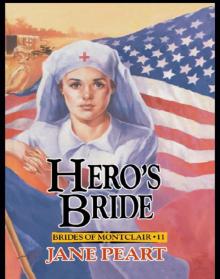 Hero's Bride
Hero's Bride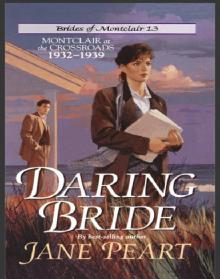 Daring Bride
Daring Bride Runaway Heart
Runaway Heart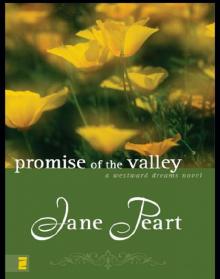 Promise of the Valley
Promise of the Valley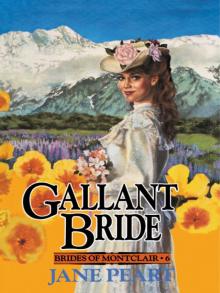 Gallant Bride
Gallant Bride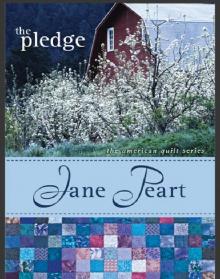 The Pledge, Value
The Pledge, Value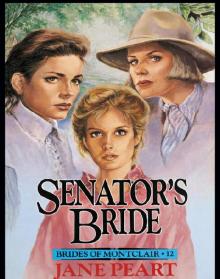 Senator's Bride
Senator's Bride Valiant Bride
Valiant Bride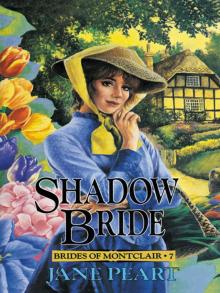 Shadow Bride
Shadow Bride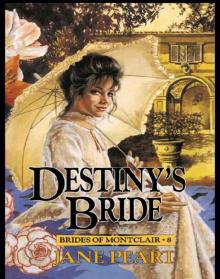 Destiny's Bride
Destiny's Bride A Tangled Web
A Tangled Web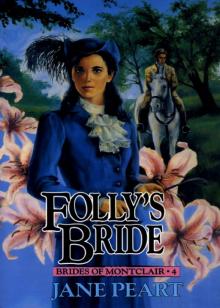 Folly's Bride
Folly's Bride The Promise
The Promise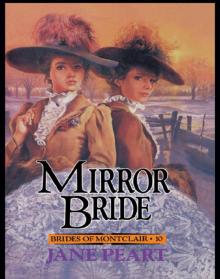 Mirror Bride
Mirror Bride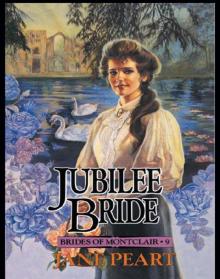 Jubilee Bride
Jubilee Bride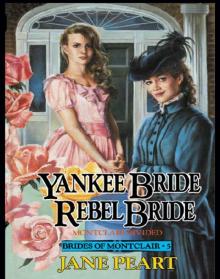 Yankee Bride / Rebel Bride
Yankee Bride / Rebel Bride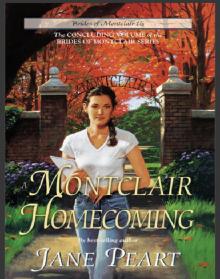 A Montclair Homecoming
A Montclair Homecoming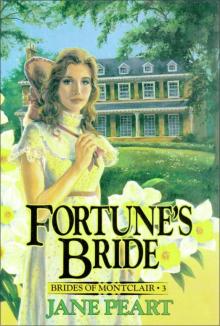 Fortune's Bride
Fortune's Bride Undaunted Spirit
Undaunted Spirit Love Takes Flight
Love Takes Flight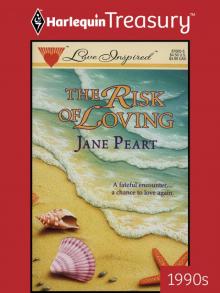 The Risk of Loving
The Risk of Loving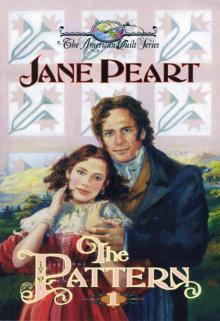 The Pattern
The Pattern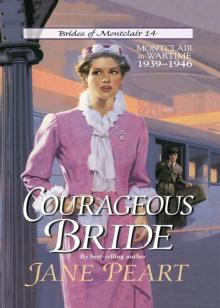 Courageous Bride
Courageous Bride